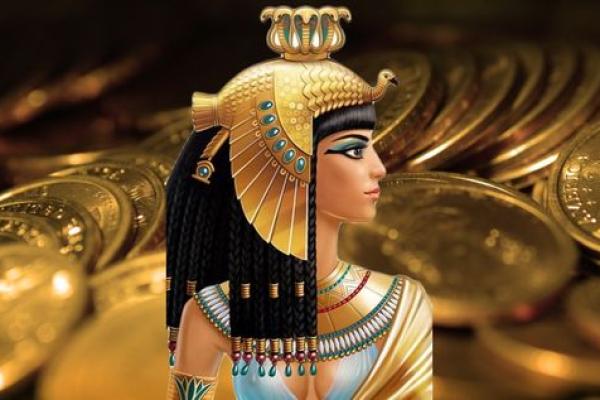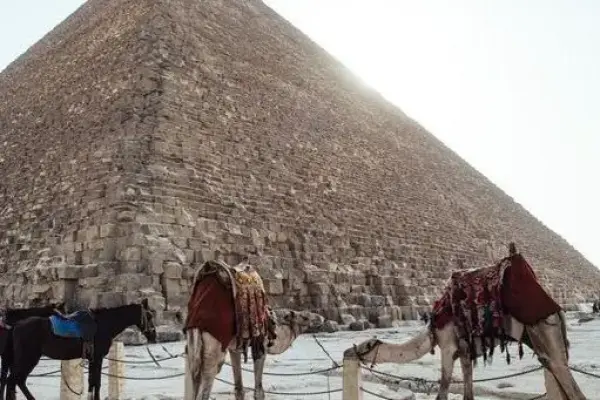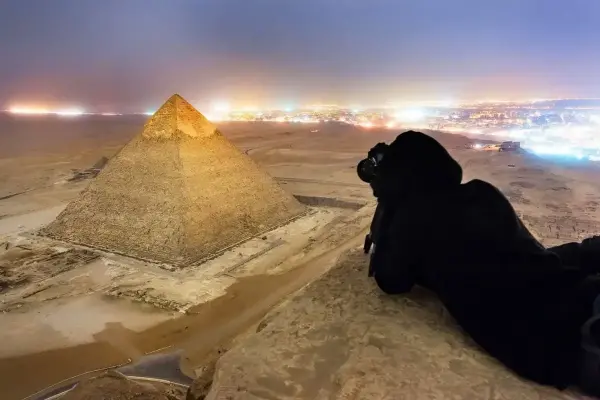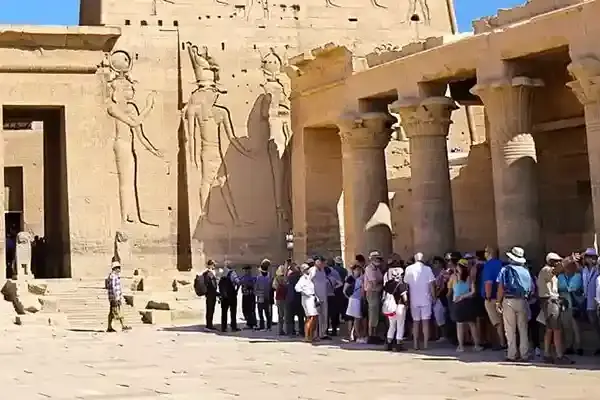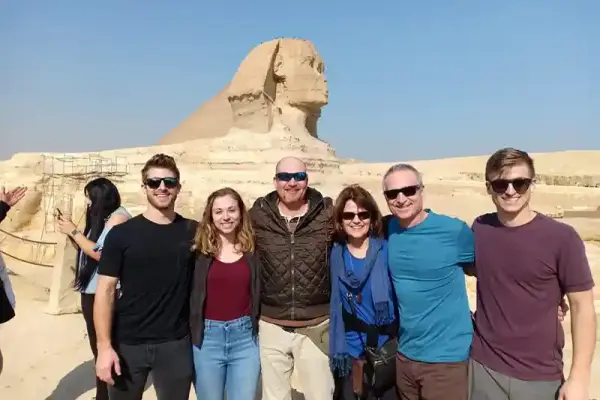Table of contents [Show]
- Queen of the Nile River
- The most powerful woman in ancient Egypt
- The Rise of Cleopatra
- One of the Most Influential Queens in History
- The Impact and Heritage of Cleopatra
- Cleopatra and Mark Antony: An Iconic Love Story
- The Significance of the Nile in Cleopatra's Era
- Ancient Egyptian Culture and Hieroglyphics
- The Secrets of Egyptian Writing
- The Magnificence of Ancient Egyptian Architecture
- Powerful Women Leaders in History
- The Library of Alexandria city
- The Legacy of Rulers in Ancient Egypt
- The Ancient Wonders of Luxor
- Nefertiti: a Legendary Women of Ancient Egypt
Queen of the Nile River
The most powerful woman in ancient Egypt
The name Cleopatra brings out overtones of power, mystery, and legend that have endured through the ages. She was the last pharaoh of the land of the Nile, the most famous, and one of the most intelligent and stubborn rulers ever to live. Her story inspires many people about what a strong woman can do in history.
Born into the Ptolemaic Dynasty, she reached the throne very hard. She became one of the greatest and strongest leaders ruling a great empire. Her reign was marked by astute political machinations, military success, and a fabled romance. The following paper will deeply explore the life of Cleopatra from their influence and relationship to her remaining significance. It will draw readers into the beauty of the Nile River, with its stunning structures in ancient Egypt,Discover all about ancient Egypt in our tailored Egypt Classic tours to further understand what founded Cleopatra as the "Queen of the Nile."
Cleopatra was the last pharaoh who led ancient Egypt astutely with political acumen and military prowess, which was recognized by strategic alliances and conquests. She is also known for her legendary affair with Mark Antony, which established her as one of the most powerful women in history. This paper shall discuss the interesting aspects of the life of one of the most powerful and influential people in history: Cleopatra, and what she has left behind for the ancient world and humankind. The rich cultural heritage they inherited from ancient Egypt, the beauty of the Nile River with Luxury Egypt Nile Cruise , and the architectural miracles of the land come alive before the readers.
The Rise of Cleopatra
Cleopatra was the famous queen of Egypt, a member of the Ptolemy dynasty that ruled Egypt for generations. The history of ancient Egypt, particularly played a huge role in shaping her early years and her subsequent rise to power, Her reign was a defining period in Egyptian history, as it sealed the destiny of two major civilizations: the Hellenistic world and the Roman Empire.
Cleopatra in Childhood: The Ptolemaic Lineage
Being the daughter of Ptolemy XII, Cleopatra was born into the Ptolemaic house, which had held sway since the death of Alexander the Great. Macedonian Greeks by origin, the Ptolemies had become thoroughly imbued with Egyptian culture while still retaining their Hellenistic identity, The basics of Egyptian politics and the predicaments a female ruler would face were very early learned by Cleopatra.
Right from an early age, Cleopatra had been groomed in the secrets of the Egyptian court and the strange politics of queens. Many languages flowed out of her tongue fluently; among them were Greek and Egyptian. Her fluency in Egyptian, unusual for her house, contributed to her identifying herself more with her subjects. Her education was not of a mere academic nature; it undertook the character of preparation for the political world she was about to plunge into. The Ptolemaic court was full of intrigue, and Cleopatra learned to navigate the intricate web of power dynamics, alliances, and rivalries.
Cleopatra had to meet many challenges to fulfill her ambition of becoming a queen. At her father Ptolemy XII's death, she was plunged into a protracted succession struggle with her younger sibling, the child Ptolemy XIII. A tradition of sibling marriage among the Ptolemies decreed that Cleopatra must share kingship with him, but it was not that simple in reality. The advisors of Ptolemy XIII worked him up to try to usurp her position; a civil war ensued that tested Cleopatra's will and political skills.
In solidifying her claim to the throne, Cleopatra was to combine strategic alliances with great diplomatic efforts. In search of outside backing, feeling the need for support, she cultivated friendships with some influential persons in Rome, the new Mediterranean power. Thereafter, one of the linchpins of her strategy would be her relationship with Julius Caesar.
Cleopatra was a woman of incredible intelligence, political savvy, and diplomatic skill and through whose hand the course of ancient Egyptian history is firmed up, It is in her rise that Cleopatra's leadership abilities are brought out, highlighting a commitment to the Ptolemaic dynasty. Her story still inspires historians and motivates women of today as a strong example of powerful female rulers in the ancient world.
One of the Most Influential Queens in History
Cleopatra was the last queen of the great Ptolemaic Dynasty of Egypt, and she played so well the role of a powerful female ruler in a time dominated mostly by men. She had skills that helped in maneuver through the strictures of her society to hold on and prosper.
Cleopatra did many great things as a pharaoh. She allied with powerful people, including Mark Antony, which increased the prestige of Egypt within the world. Her wise judgments and leadership made her one of the great female rulers in history during times when very few women could become an authority.
Cleopatra's impact on Egyptian society was profound. She championed the arts and initiated grand construction projects, while also striving to preserve Egypt's cultural heritage. Her reign exemplified the potential of powerful women leaders to overcome substantial challenges you can Enjoy with Egypt adventure tours with our guide.
Cleopatra was known for her enigmatic diplomacy and political strategy, using wit and grace to guide complexities reigning in ancient power struggles. She remains, therefore, one of the greatest inspirations to mankind all over the world about what potential lies within human beings through vision, determination, and courage. Cleopatra's life goes a long way toward showing what a woman can do in history.
The Impact and Heritage of Cleopatra
Cleopatra was the last pharaoh of ancient Egypt and was often referred to as the "queen of Cleopatra." She was the last pharaoh to conclude the period of the Ptolemaic period in the land. The last pharaoh, Cleopatra VII, who proved to be an excellent diplomat and strategist at the end, made great alliances with Julius Caesar and Mark Antony, two of the important Romans, With a very strong leadership ability as a woman, she portrayed resilience and capability. Facing the supremacy of the Romans, Cleopatra worked diligently to preserve the independence and prosperity of Egypt, and her treaties with Caesar and Antony were daring attempts at saving her empire. After her death, Cleopatra VII emerged as a legend from her historical character and inspired several forms of art literature and other cultural expressions. She remains an inspiration to women in general to become strong. This woman has bequeathed a legacy to ancient Egyptian history by being one of the most efficient and effective rulers. She was to be the last of her line from the Ptolemaic dynasty, and thus, as such, her image stands for women's leadership and continues to inspire people to this day.
There is hardly any love story in the ancient world as renowned as that of Cleopatra, the fabled queen of Egypt, and Mark Antony, the invincible Roman general. For hundreds of years now, people have moved at their romance acted out against the exotic backdrop of ancient Egypt. Their romance shows how much love can affect not merely individual lives but also the political situation is a story of love and politics. Cleopatra was both brainy and strategic but also extremely beautiful. She allied herself with the strong and charismatic Mark Antony, who was truly attracted to her magnetism and genius. The two formed a very special bond that reverberated in each of their romance and politics, leaving an everlasting impact on ancient Egypt and the Roman Republic.
The love story is among the most unforgettable and tragic in all of history because it only shows just how potent passion can be, but power much more so, But theirs was not a smooth sail in love. They had to fight to cling to ancient Egypt, fighting the challenge of Octavian, a power-hungry leader of the Romans. And this was to have a profound impact on their love and the fortunes of ancient Egypt and Rome. The romance between Cleopatra and Mark Antony remains fresh in the minds of people even today. Such was this legendary tale that art, literature, and films have been written on it forever. It serves as a testament not only to love but also to ancient Egypt and how far it has come in changing the way history would eventually turn out to be.
The Significance of the Nile in Cleopatra's Era
The Nile River was the backbone of life and the rise of ancient Egypt during the reign of Queen Cleopatra. This river gave water but had a more tremendous effect on the cultural, economic, and political spheres of this region.
The annual flooding of the Nile was a natural factor that made agriculture successful in ancient Egypt. The quantity of silt left by these floods was rich in nutrients and thus turned the land into very productive soil, thereby allowing the production of many types of crops, This agricultural richness fed the people and boosted the economy during the reign of Cleopatra, she lived to the importance of the Nile and did everything in her capacity to ensure that its resources were managed wisely. It gave impetus to her reign and made a lasting impact on Egyptian history by ensuring the wise use of the water from the river.
The Nile was an integral part of life for the ancient Egyptians, more so under the rule of Cleopatra. Her shrewd management of the Nile made her very significant in Egyptian history.
Ancient Egyptian Culture and Hieroglyphics
Hieroglyphics hold a special place in the culture of ancient Egypt, showing a huge respect for history and beliefs. These intricate symbols, incised into stone and written on papyrus, were a reflection of feelings about heritage, spirituality, and artistic expression for the Egyptians.
The hieroglyphic script was complicated, with symbols used to represent the production of sounds, words, and concepts. These symbols included such pictures as natural scenery, gods, and myths, which created a tapestry of pictorial representation of life around ancient Egypt.
The Secrets of Egyptian Writing
For many years, the hieroglyphs remained a mystery. Then, in 1799, everything changed as the Rosetta Stone was discovered. The stone had the same text inscribed on it in three languages, thus enabling scholars to decipher hieroglyphics. It opened a window of knowledge into ancient Egyptian history and their religion, culture, and how each had contributed toward civilization. The hieroglyphic system was represented by more than 700 symbols, each carrying its independent meaning. Hieroglyphs documented history, religious texts, poetry, and other official documents. Figures like Cleopatra depended on hieroglyphics as a means of communication, and preservation of Egyptian heritage. These hieroglyphs were so important that even today, scholars take loads of time studying them, increasing manifold our understanding of ancient Egyptian history and culture to show just what truly remarkable feats could be done by Cleopatra and her contemporaries in Luxor.
The Magnificence of Ancient Egyptian Architecture
Among the most outstanding structures that narrate and speak of ingenuity and artistry are those brought out by the ancient Egyptian civilization. During the reign of Cleopatra, Egyptian architecture had reached its peak and was able to prove this civilization's capability and might. Some of the outstanding historical features relating to Egypt were the Pyramids of Giza, which were found near Luxor. These colossal tombs of pharaohs, having flawless sides and intrinsically designed interiors, were a token of the sophisticated construction techniques of the Egyptians and continue to amaze visitors from across the world.
This civilization is also known for huge temples and other sacred places built by them. One such place is the Luxor Temple of Karnak, an extended complex with tall pillars and remains of intricate carvings. These areas were crucial for religious rituals and gave a reflection of the light and civilization of ancient Egypt.
They also constructed palaces and whole towns and tombs for their dead, the ruins of Thebes modern Luxor are evidence that they planned even their cities superbly: wide streets, fine buildings, good water, and impressive infrastructure, Ancient Egyptian architectural wonders astound scholars, historians, and travelers even today. These edifices of great design and deep sense mirror the creativity and cultural richness of this ancient civilization that inspires and enthralls all kinds of people around the world.
Powerful Women Leaders in History
History is full of powerful women leaders. One such example is Cleopatra, a well-known female ruler in ancient Egypt. Epitaphically, she still inspires us with a different view of gender and leadership.
She was the last female pharaoh of ancient Egypt, she made a huge contribution as a leader, politician, and strategist. She made a dent in a male-driven society and commanded respect amongst her peers.
She was a real "female emperor" who led her armies, negotiated treaties, and changed history. Her story testifies to the role women leaders have always played in changing our world. They had to bear so much but never let their sex be such a hindrance, It is in her legacy that we are inspired to break the chargeable status quo and to fight more for equality and the need for more representation of women in leadership.
Looking up examples of good women leaders, such as Cleopatra, will make all of us respect our predecessors. Their stories teach us that our gender should not become a hindrance to our dreams. After all, what matters is our character, the visions in our minds, and the fire in our hearts.
The Library of Alexandria city
Under the reign of Cleopatra, the great Library hosted by Alexandria in ancient Egypt became a very important center for study and intellectual debate. Great scholars, philosophers, and other thinkers would come and learn from one another in such a place. It held an astonishing collection of between 700,000 and 1 million manuscripts on topics that ranged from Egyptian history to the latest in science and literature. This huge collection of information spoke volumes about how ancient Egypt was intellectually gifted and hungry for even more knowledge. Surely these scholars of the Library of Alexandria went a long way in furthering the cause of knowledge related to the ancient world, to then seal the deal in the minds of many Mediterranean thinkers. Alas, such a library was doomed to an end brought by fire and turmoil, and its invaluable store of knowledge was lost forever. The memory reminds us that our quest for learning is infinite and that ancient wisdom must be preserved. The Library of Alexandria marked the climax of ancient Egyptian civilization, but even today, it seems to arrest the minds of scholars and enthusiasts.
The Legacy of Rulers in Ancient Egypt
The Ptolemaic dynasty formed an integral part of ancient Egyptian history. This was a family that ruled almost from the time of Alexander the Great's death in 323 BCE to Cleopatra's death in 30 BCE. It is reported that Cleopatra, the last pharaoh, left quite an impression on Egyptian history.
Cleopatra came from Ptolemy I Soter, one of the trusted generals of Alexander the Great. Over time, the Ptolemaic rulers became powerful. They had a reputation for their culture, architecture, and complicated family issues.
Cleopatra took the throne in 51 BCE with her brother Ptolemy XIII, her reign was not without its issues, as she found it necessary to partner with Mark Antony to overcome her issues and This relationship was to be the downfall of the Ptolemaic reign.
"Cleopatra was the last active ruler of the Ptolemaic dynasty, which had ruled over Egypt since the death of Alexander the Great in 323 BCE." Cleopatra's role in the Ptolemaic family and the alliances she made have made her famous.
The Ancient Wonders of Luxor
This southern Egyptian city of Luxor unbelievably showcases the rich heritage of ancient times and civilization that once bloomed in Egypt. You will swim into the world of the iconic Cleopatra and learn more about her reign here.
It's simply overwhelming, considering that some of these very Temples, Tombs, and Monuments in this city are just gorgeous. The Karnak Temple Complex has towering obelisks and imposing statues that are testaments to ancient Egyptian artistry, while the Valley of the Kings houses tucked-away chambers wherein Pharaohs, including Cleopatra, were laid to rest.
Stroll through the Luxor Museum, and you will see some beautiful relics of ancient times: intricate hieroglyphics and marvelous sculptures that show the peak of artistic expression during Cleopatra's reign.
Busy markets and streets of Luxor give a feel of everyday life from bygone days. It is also bisected by the Nile River, relating to the depth of its history and culture.
A trip to Luxor whisks the visitor into the days of the ruling Cleopatra, into a city that still charms those keen on exploring the wonders of ancient Egypt.
Nefertiti: a Legendary Women of Ancient Egypt
Among the legendary women in the ancient Egyptian world existed Nefertiti and Isis, renowned in their own right. While Cleopatra gets most of the attention, these women had a strong influence over Egyptian history and culture. Nefertiti had a meaning of "The Beautiful One Has Come." She was a queen and co-regent during the 18th dynasty. She was celebrated for her beauty and leadership qualities, which contributed enormously along with the legendary plurality of husbands she possessed toward the transformation of religious practices in loyalty to the sun god, Aten.
On the other angle, Isis was a goddess in the ancient Egyptian perspective of mythology and religion. She represented motherhood, magic, and the protectorate of the dead. Her worship far transcended Egypt, this speaks of the legacies of women in powerful positions.
Nefertiti and Isis represent an entirely different history of what women were that differs from the tale of political intrigue and romance represented by Cleopatra. Put into perspective, their stories make clear the multifaceted contributions women have made across history.
And yet, one very famous quote just passes it by how women could affect history. On the contrary, Nefertiti and Isis remind us that this glorious heritage of ancient Egypt is enriched by powerful men, but also includes its legacy of strong women leaders.
The final ancient Egyptian pharaoh considered in this last section is that of Cleopatra. Her life and reign were powerful; as such, she has greatly impacted our notion of ancient history and culture from Egypt. They also underscore the important role that women have played in leadership.
Though many centuries have passed, Cleopatra's story still touches people's hearts. It reminds us of our past and the future perceptions in our minds. Her strategic and diplomatic abilities, and endless devotion, marked huge success. As we bid farewell to this legendary heroine, we remember her as a core figure in ancient Egyptian history, and that is how powerful women are leaving their mark on history.
From the Ptolemaic dynasty at the start to her rise and famous love with Mark Antony, it was a story that captured many about Cleopatra. We know far more about her world and what shaped her if we consider the Nile River, ancient Egyptian culture, and its impressive buildings. The added depth of understanding is given to views of Cleopatra's legacy know before you go with Egypt Online Tour
Popular Categories
Related tours
Cairo, Aswan, and Luxor
-
Starting From
$ 2,850
-
Type
Package
Cairo, Aswan, and Luxor
-
Starting From
$ 1,600
-
Type
Package
Cairo, Aswan, and Luxor
-
Starting From
$ 1,850
-
Type
Package
